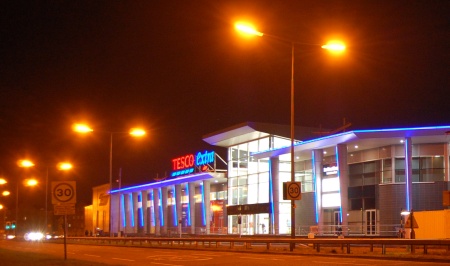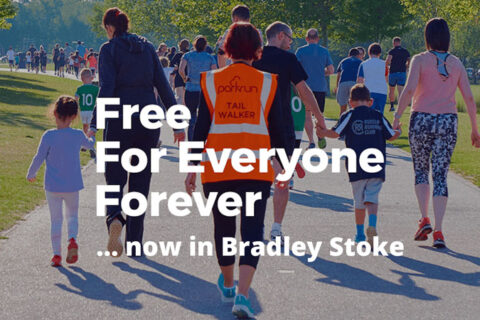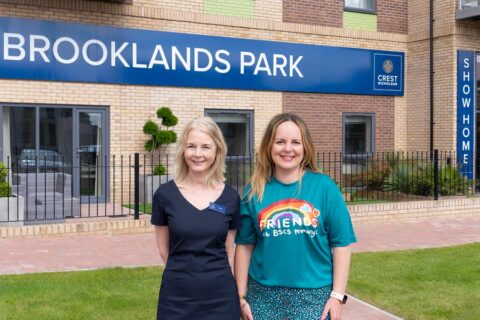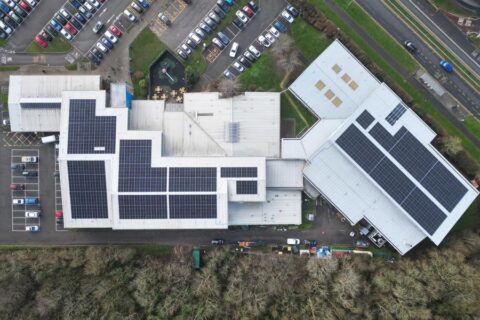
With the second anniversary of the introduction of part-night street lighting in Bradley Stoke coming up next month, The Journal has today launched an online poll to gauge readers’ views on the scheme.
A public consultation carried out by the town council in 2010 found 54% of the 153 respondents in agreement with the plan put forward by South Gloucestershire Council (SGC), under which most street lights are turned off for five hours a night, nominally between midnight and 5am GMT (1am and 6am BST).
In general, all street lights have been switched to part-night operation, except on stretches of road within a specified distance of major junctions or roundabouts or where the road incorporates traffic-calming features. Lights are also left on throughout the night near pedestrian crossings and along enclosed footpaths.
According to information obtained by The Journal, installing the new photocells necessary to implement the scheme in Bradley Stoke cost SGC £25,756. The annual saving in electricity costs is estimated at £16,800, with annual carbon emissions being reduced by 105 tonnes.
SGC claims there has been no increase in recorded crime since the part-night street lighting scheme was introduced, although enquiries by The Journal reveal that the police are unable to provide crime statistics for the specific hours during which the lights are off, with the period 6pm to 7am being used as the basis for analysis.
When the switch-off first came into operation, there was a backlash from many residents, with one calling the scheme “insane” and others demanding the lights be switched back on in their street. One town councillor even claimed that residents’ human rights were being violated but he later had to accept that councils have no legal obligation to provide street lighting.
What do you think about the street light switch-off? Leave a comment on this story and complete the Journal poll in the sidebar of the website to let us know.
More info: Part-night street lighting in South Gloucestershire (SGC)




I have always thought that it was an accident waiting to happen… Just imagine if somebody had used it to attack somebody or mug them. It was the councils fault for buying faulty light components… Why should we have to suffer whilst the council makes its money back through it own incompetence. If things ever go back to normally and they probably won’t now… I think it’s a failure people will talk about for years to come. Not the best legacy the council can leave behind them really. I personally don’t feel safe at night, it would be interesting to know if night crime had gone up as a result. Kim Jong Il x
Although I wasnt sure at first it makes good sense, the savings and carbon emissions outweigh any inconvenience caused. In some areas crime has fallen as a result of lights being off, presumably as the criminals have to use a light to see what they are doing!
Cant sayas its been an issue here. We dont normally notice they have gone off. As long as crime continues to not be an issue it should continue. We are more likely to spot a burglar if we see a torch flashing somewhere, than some one just walking along the road.
Its a great Savings. Hopefully the money will be channeled to somewhere else where its more useful….
I think its a joke. People who live down off roads or cul-de-sacs are plunged into darkness while main roads are still lit up. Dont even get me started on big tesco! If its closed why does it need to be fully lit as is the mall for no reason at all. Its dangerous walking home in pitch black as many have to do pub goers, dog walkers ect. How much does it really save and is it worth putting peoples lives and safety at risk. Put the lights back on!!!
Savings are being made in energy costs (hope the money is being channelled into better things for the youngest, oldest and most vulnerable members of the Sough Glos population) and CO2 emissions are reduced. Nights are darker which is better for sleeping, better for wildlife, and better for those of us who like to stargaze. Overall crime numbers seem to be down (as others have said, presumably because criminals would have to carry a torch). Most incidents of criminal activity (and there are not a lot) that have become a BSJ news item have occurred at times when lights are ON, or in daylight.
This has been a win-win story and SGC should be congratulated for piloting and now widely implementing the part-night lighting strategy.
The poll omits an important option which diminishes its value. Why not:
“Yes, but apply it more aggressively”
It would be interesting to see not merely the level of support for the current scheme but also to see how many people think the council were unduly influenced by a vocal minority into reducing the scope of the scheme.
Let me get this right, it cost £25,756 to start this scheme and it has saved £16800 per year over 2 years, which means that it has shown a net profit of £7844.
Was it worth it, and what was the money spent on?
SGC claims there has been no increase in recorded crime since the part-night street lighting scheme was introduced,
I dont believe this is right. In our street 4 burglary happend in last 1 year only!
I would like to see street ligh on through out the night and people feel safe in their own house and street.
In my street people use as an ‘unofficial’ walk through to a main road (no official right of way). At night we use to get quite a few drunks staggering through; we’ve had glass bottles smashed on the road, garden ornaments kicked over, litter and of-course shouting etc. During the warmer months with the windows open I have been woken on a number of occasions.
Since the council switched off the street lights, the drunks seem to stick to the main road and no longer cut through. I cannot remember the last time I was woken up by anti-social behaviour since the lights started going off.
This might be quite an isolated case; but to me and I’m sure others in my street its actually made life better.
It’s a great idea and great savings
I don’t think it makes any difference whether the lights are on or off, the energy efficient ones installed everywhere produce no light on the pavements anyway! If someone is walking down the lit street wearing black, you wouldn’t see anymore of them than if the light is off.
Yes to the energy saving …now, what about all those massive empty office buildings at Aztec West and the like who have lights on ALL NIGHT?!?!? That’s criminal … turn THEM off too!
I agree with lucy – it’s a joke that our street lights go off but we have tescos lit up like a christmas tree at night! It’s like having a 24hr football ground behind your house! I don’t think tesco need all the car park lights on 24/7! Might save them some money if they switched 50% of their lights off
How many council members have commented above? And there are some ridiculous excuses also. I’m so sorry I have taken street lighting for granted for all these years… Truly, chopping your nose of to spite your face. Well done SGC I’m SURE the streets are truly safer with them off. Actually ridiculous, emissions excuse is just to cloud the incompetence and shame on you all for sucking that up!
I was one of the small number who objected especially the underhand the original survey was not well publicised therefore leading to very low response!
I still disagree with the insane method of turning our small cul de sacs in to pitch darkness. I would like to see proof from police that crime falls in unlit areas, I think it would be the opposite, as criminals prefer to work in the cover of darkness!
Original plan was to keep lights on later at weekends, that never happened, so making it impossible to walk home safely from a night out.
As for the comment above talking about a profit? I calculate the figures as a loss. We were also promised repairs to potholes and broken pavements, tried reporting several dangerous trip hazards in our road, only one was repaired….
Now there is talk of council wanting to charge us for recycling our waste, another money making scheme for the council!
I never even noticed the lights went out… are the council going to reduce tax for the money saved? It could pay for the green bins !
Simply put’s late night pedestrians at risk, and clearly as other peoples comments suggest, there is evidence to show it does not deter burglaries or other crimes. I recall over Christmas the was a number of mugging incidents in one of these areas that switches off the lights at night. Ridiculous putting people, their homes and drivers safety at some risk over an electricity bill.
I live on my own with a young child. It has made me feel very uncomfortable and unsafe. So I have had to get a front and back sensor light fitted to my home. I approve of helping the environment, but not when it makes us feel unsafe.
Well I hadn’t noticed which must mean there has been minimum impact. I think it’s a great idea providing the crossings and junctions are well lit. It seems like the scheme has paid for itself in the 2 years and that’s not a bad pay pack period and with other expected cuts in spending this seems like a low impact measure. I can understand people’s knee jerk reaction that it will be unsafe or attract more crime but so far that doesn’t appear to be an issue. If we take personal responsability for ourselves when walking home from a night out like not flashing our expensive phones about, keeping our wits about us (1 less drink before we head home), sticking to main routes and roads where junctions and crossings are lit then we should be less of a target. We are too quick in this day and age to be ready to blame somebody else. I hope the council have been able share the scheme results with other areas.
I would be interested in the road safety aspect of this as the usual 30mph limit is based on the particular road having a system of street lighting. Can the police clarify if they now have an issue actually enforcing speed limits. In the absence of lighting or a specific traffic order the national speed limit would apply
In August 2006, the Department for Transport issued new guidance relating to speed limits. It states that:[1]
Section 82(1)(a) (of the Road Traffic Regulation Act 1984 (RTRA 1984)) defines a restricted road in England and Wales as a road which is provided with “a system of street lighting furnished by means of lamps placed not more than 200 yards apart”. Section 81 specifically makes it an offence for a person to drive a motor vehicle at a speed of more than 30 mph on a restricted road.
“Street lighting” is further defined as follows:
As set out in paragraph 45, it is generally recognised that a ‘system’ of street lighting could be three or more lamps spaced not more than 183 metres apart. However, street lighting (for the purposes of determining whether or not a road is a restricted) is not necessarily limited to street lamps, but may extend to lighting provided by authorities or parish councils.
To avoid confusion that could arise if some 30 mph zones were ‘street-lit’ and some were not, DfT guidance goes onto say:
Direction 11 of The Traffic Signs Regulations and General Directions 2002 (TSRGD 2002) defines the requirements for the placing of speed-limit repeater signs. This states that speed-limit repeater signs cannot be placed along a road on which there is carriageway lighting not more than 183 metres apart and which is subject to a 30 mph speed limit. The Department will not make exceptions to this rule.
This leads to the conclusion that:
This means it should be assumed that, unless an order has been made and the road is signed to the contrary, a 30 mph speed limit applies where there are three or more lamps throwing light on the carriageway and placed not more than 183 metres apart.
I am against turning off street lights at night.
I am a doctor and work night shifts, sometimes being called to work in the middle of the night or coming back home in the early hours of the morning, whilst it is still dark. That means that I have to find my way from my car to my front door in pitch darkness and this causes me and my family unnecessary distress. I FEEL UNSAFE!
The Council has told me by email that turning the lights off has not increased criminality, but if I, as a tax payer, am feeling unsafe, surely that is what matters!
Also, since the switch-off, my neighbour’s window has been smashed during the night, my window has been hit by eggs several times – I believe the vandals target the lamp I leave on in the living room, the only visible light in the street, and the number of drunks that hang around the street at night has increased.
The little savings promised by the switch-off do not justify the discomfort imposed on the population. Unless you are happy with the curfew the Council has instated on us, forcing people to be home before dark, and you don’t care about people who may want or need to go outdoors after the lights are turned off. I believe this is wrong!
I’m 20 years old. I don’t go out in B stoke much but why would I be out between 1 & 6. (.don’t like stupud teenagers so tend to stay away from idiots) but I don’t even notice the lights go out to begin with it was quite scary but I have seen no crime around me. so I don’t really care everyone got a bit too emotional over this I think. Bit dramatic responses people!
How can a public consultation be representative of the population of South Gloucestershire when it was based on the minuscule figure of 153 respondents of which barely 54% were in agreement? These figures are by no means statistically significant.
In reality, there was no genuine public consultation regarding the street lighting, an important aspect of daily life.
As a female, I feel that having no lights on outside during the night when I live in a residential area of a town, not in the countryside, is an aberration. The fact that there is no street lighting has changed my habits, making me rush home earlier than I would normally for fear that I will have to walk in the dark from my car to my front door. In practice, it works as a curfew to which neither I, nor anyone else, should be subjected.
My impression is that people are accepting this situation due to conformism, or because it is currently felt fashionable to do something supposedly eco-friendly or pseudo money-saving, even though the wellbeing of us citizens and tax payers is being neglected – or because it has so far not affected their lives directly.
We will have to wait for some regrettable darkness-related crime to occur for this madness to be rectified.
We’ve closed our reader poll after four weeks and four days of voting.
The result shows a slim majority in favour of the current system:
To the question: “Should street lights be turned off overnight in Bradley Stoke?”
53% voted “Yes, keep the current system unchanged” (94 votes)
26% voted “Yes, but there should be more exceptions (selected lights left on)” (47 votes)
21% voted “No, keep all street lights on throughout the night” (37 votes)
The figures are surprisingly close to those found during Bradley Stoke Town Council’s public consultation carried out prior to the introduction of the scheme (over two years ago), which were 54%/23%/17%.
54% what a great majority to bolster the continuation of this idea, long may it continue! – not! I’m sure everybody feels safer at night thanks to the councils cock up of purchasing the wrong component for our street lights. Please continue to pitch it as an energy saving motive and not a cost saving measure to keep your jobs and seats safe. Clap clap clap. Some people in BS will definitely fall for any old BS.
As. South Gloucestershire Councillor (Yate) in reply to those who ask where the savings go; The council is effectively capped and it is a case what other services would be cut if these savings are not made.
As a council we have been making savings through mostly changing the way we provide services and back office cuts. There are nort much more we are likely to find. In future cuts will have to be in services such waste collection, street scene ( road side verges etc).
Think George Ferguson has been voting on the poll. SAVE ENERGY PEOPLE!!!